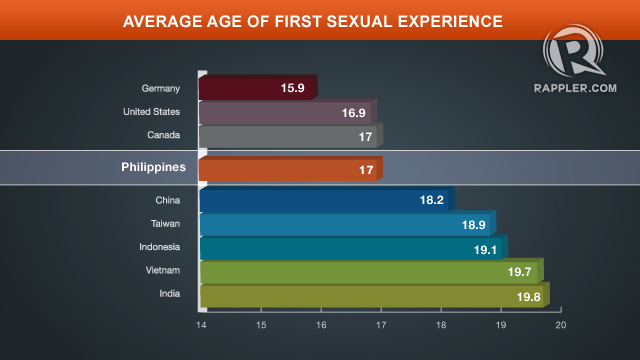SUMMARY
This is AI generated summarization, which may have errors. For context, always refer to the full article.

Certainly many people—parents, teachers, legislators, and even priests—are interested in hearing the answer to this question. And why wouldn’t they, considering that the Supreme Court is set to rule over the constitutionality of the Responsible Parenthood and Reproductive Health Law of 2012 (RH law) soon.
But aside from being interesting and quite controversial, this question is extremely relevant and important to deliberate.
The RH law, depending upon its implementation, will certainly have many implications on health, social norms, and the economy that Filipinos, as the tax-paying public, should be attentive to and, when necessary, be critical of.
Sexual debut
What exactly is the issue? Many people are concerned that the RH law will expedite sexual debut, a fancy term pertaining to the moment a person has sex for the first time. (Sexual debut is synonymous with sexual initiation, onset of first sexual experience, and “the time you lose your virginity.”)
Associate Justice Marvic Leonen voiced a similar concern when he asked Senator Pia Cayetano during oral arguments whether the RH law encouraged teenage sex or promiscuity. To this, Senator Cayetano categorically responded “no.”
According to data from 2002, Filipinos on average lose their virginity a while after they turn 17. This so-called average age at first sex is slightly older compared to many developed countries such as the United States (16.9), Canada (17), and Germany (15.9).
Filipinos, however, are having sex earlier than their Asian neighbors such as Vietnam (19.7), Indonesia (19.1), and Taiwan (18.9). Even people from India and China, the two most populated countries in the world, are having their first sexual experience at a later age (19.8 and 18.2 years old respectively) compared to Filipinos.

Benefits of delayed sex
Government agencies tasked with implementing the RH law should be concerned about early sexual debut not because religious morality looks down on premarital but because delaying sex has many benefits for teens.
Abstaining from sex, for example, remains the only perfect way of preventing unplanned pregnancies and protecting against a range of sexually transmitted diseases (STDs) including HIV. Condoms and hormonal contraceptives are, of course, very effective but they need to be used properly in order to work well every time.
Similarly, research has shown that early age at first sex is associated with a number of unhealthy behaviors and outcomes including unprotected sex during first sexual experience, an STD infection in adolescence, inconsistent condom use, and having multiple partners.
Condom access programs
The fear that condoms and sexuality education will promote sex may seem intuitive, but scientific research so far shows no basis for such fear.
For instance, studies from Boston, Los Angeles, Seattle, and several schools from the state of Massachusetts have all found that condom access and distribution programs did not promote early sexual debut among teens. And among students who were already sexually active when the programs were implemented, enhanced condom access did not increase their frequency of sex or the number of their partners.
.jpg)
In fact, there is evidence suggesting that condom access programs delay sexual debut among teens and can also help decrease sexual activity among those who are already sexually active.
A recent analysis of 21 studies conducted in the U.S. and in nine other countries in Asia, Africa, and Latin America confirmed these findings. Researchers found that condom access programs were not only associated with an increase in condom use among sexually active teens, but also a delay in sexual debut, increase in abstinence, and lower incidence of STDs.
Sexuality education
The same outcomes have been reported by studies that look at the effects of sexuality education on the sexual behaviors of students in late elementary and high schools.
Research has shown that teaching teens about safe sexual practices and the proper use of contraceptives does not hasten sexual debut. In fact, sexuality education has consistently been associated with delayed sexual debut, a decrease in sexual activity among sexually active teens, and reduced teen pregnancy rates.
While no one is disputing the value of sexuality education on teen health, experts are still trying to find the most effective type of sexuality education. Two camps exist today, with one group arguing for the merits of abstinence-only programs while the other group contends that comprehensive sexuality education alone can reduce teen pregnancies and delay sexual debut.
A study published in 2010 showed that abstinence-only education was effective in delaying sexual debut among teenage girls. Two reviews, however, one published in 2007 and the other in 2008 found no evidence for the effectiveness of abstinence-only programs.
This has lead opponents of abstinence-only education to call the omission of safe sex information “scientifically and ethically problematic.”
Some caveats
Certainly, conclusions from these studies are not immediately applicable to the Philippines nor do they imply that condom access programs and sex education in schools are the sole causes of delayed sexual debut in other countries. Given the unique social and cultural context that is the Philippines, we are also uncertain how young Filipinos will respond to the different components of the RH law.
But the findings mentioned here highlight the promise of the RH law and its objectives. There is currently no evidence for the claim made by RH law opponents that our youth would become promiscuous once they’re introduced to condoms and sexuality education. – Rappler.com
Anton Avanceña is a global health graduate student at the University of California, San Francisco. For questions about the studies cited in this article, or for thoughtful comments and suggestions, contact the author at antonlorenzo.avancena@ucsf.edu.
Read his related articles:
A hard look at abortion in the Philippines
iSpeak is a parking space for ideas worth sharing. Send in your contribution to move.ph@rappler.com with [iSpeak] in the subject line.
Add a comment
How does this make you feel?
There are no comments yet. Add your comment to start the conversation.